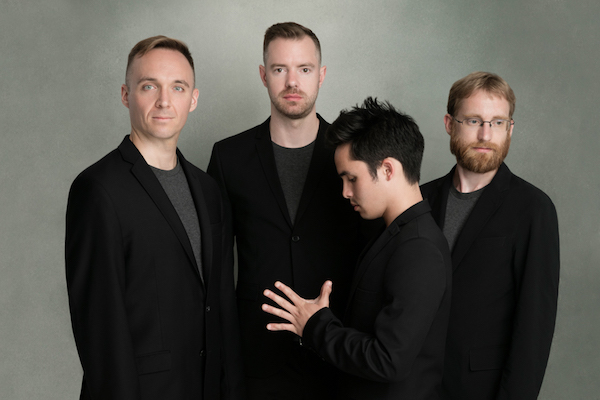A gritty and transcendent fury in Eckardt premiere from JACK Quartet

After the pandemic forced a postponement last year, the TIME:SPANS festival of contemporary music is back, and making up for lost time with eleven concerts.
The pandemic is not over yet, but the festival is managing the situation by requiring proof of full vaccination or a recent negative Covid test to enter Mary Flagler Cary Hall at the DiMenna Center. Patrons must be masked as well.
With this, and a reduced number of chairs, it was still a full house Wednesday night, with JACK Quartet and soprano Tony Arnold delivering two world premieres. The composers were Amy Williams and Jason Eckardt, each with a piece completed last year.
Williams’ Urquintett, for soprano and string quartet follows from Kurt Schwitters Ursonate, a deliberate choice for the composer, who saw a performance of the piece by Eberhard Blum in her own home when she was young and never forgot it. And who would? In the right hands, Schwitters’ monologue of nonsense words and sounds can be liberating and exhilarating.
In one way, Williams’ work is analogous. Instead of notes and rhythms, she breaks down her musical language to simple, small sounds and gestures, like attacks and articulations, and builds it up from there. In another way, Urquintett is so different from Ursonate that they are like two roads, heading at right angles away from each other. As easy as it is to enjoy and admire Ursonate, there’s nothing else like it, and nothing that can be like it. There’s an argument to be made that Schwitters’ composition is less musical than a Dadaist theatrical and even literary work—a way to reject the commodified logic and taste of bourgeois capitalism by confronting it with a subversive manner and nonsense language.
But William’s Urquintett skillfully made an enjoyable experience on its own terms, even if those terms are pretty much what Schwitters was opposed to. Both the quartet and Arnold had fragmented, abstract elements to work with, gestural language like attacks, articulations, timbrel manipulations, and individual sounds and syllables.
The attractive sound and fun of the music came through in the performance. JACK and Arnold are the kind of musicians of whom one expects absolute skill and clarity when playing something new, and one came away thinking that this, indeed, was what Williams intended. On top of that, the musical personality of the artists meant that there was more than a little Loony Tunes cartoons, and that’s something that the musicians seemed to enjoy working with. Even if this was not Williams’ explicit intention, it was the special quality one hears in live, high-level collaborations between composers and musicians.
Eckardt’s premiere was the debut of his completed, three-movement string quartet, Passage. The opening section (“Subject”) was first heard in 2015.
Eckardt’s Passage confronts the malevolence of modern life, of state power and violence over individuals. His writing is hyper-expressive, dissonant but with a foundation of tonality always just below the surface. His thematic idea is presenting a journey that begins with torture (specifically the use of sensory deprivation) and then finds a way through recovery and what he hears as public testimony, truth-telling, to some kind of settled point as a way to overcome and go beyond. Passage is full of violent beauty and a fury that is expressed by the energy discipline that Eckardt has over his material and the sharp precision of the performers.
“Subject” opens the quartet played in very low light and uses bright lights, flashing in bursts in time with the music, to create an intense effect of whipsawing between deprivation and hyper-stimulation. As controlled as the music is, one felt a growing intensity and anxiety. The following two movements, “Ascension” and “Testify,” never resolve musically in a familiar manner. Eckardt sticks to his concept and the music sounds like it is carving out some kind of stability and energy against powerful external forces.
As long as one can commit to and accept what Eckardt has to say, this is a powerful and valuable experience. There were stretches of the performance that were completely gripping, as with the sustained passages of dissonance and high-pitched long tones.
JACK’s execution was tremendous. One substantial stretch had the quartet slowly rocking back and forth between two sustained chords with some finer-than-quarter-tone tunings. The group’s intonation was so precise that the held notes never wavered, the consistency of the microtonal intervals never flagged, and the group produced an uncannily gorgeous sound, with throbbing and singing difference tones. This is one of those rare premieres that was genuinely a transcendent experience.
TIME:SPANS continues through August 29. JACK plays world premieres from Eduardo Aguilar, inti figgis-vizueta, Brittany J. Green, and Olivia Shortt, 7:30 p.m. Thursday in Mary Flagler Cary Hall. timespans.org